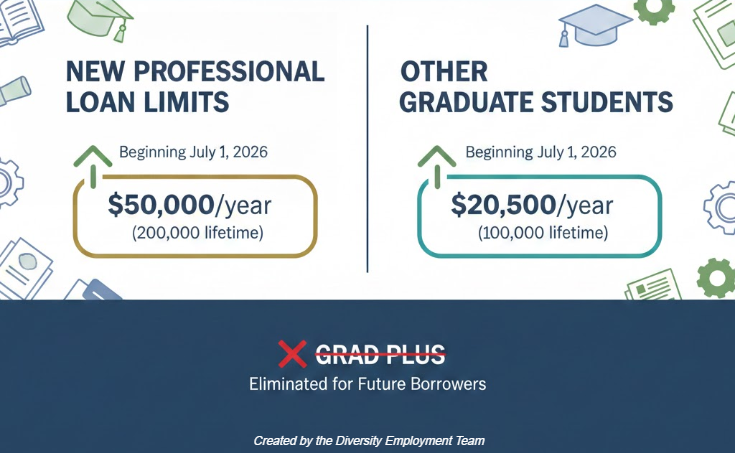What’s New: As the Education Department (ED) continues to implement the One Big Beautiful Bill Act (OBBBA), it’s advancing a definition of “professional degree” that does not include nursing. That matters because OBBBA sets higher federal loan caps for professional degree programs than for general graduate programs. Beginning July 1, 2026, new borrowers in professional programs can borrow up to $50,000/year ($200,000 lifetime), while other graduate students are capped at $20,500/year ($100,000 lifetime); and Grad PLUS is eliminated for future borrowers.
How the Department Defines it
Under the current draft and negotiated-rulemaking notes the working definition describes a “professional student” as one enrolled in a program that awards a professional degree (common examples are: medicine, dentistry, law, veterinary medicine, optometry, osteopathic medicine, podiatry, chiropractic, theology, and clinical psychology). Nursing, physician assistant, physical therapy and audiology programs are not on that list under the proposal.
The Department’s Stance
A department spokesperson told Newsweek the coverage claiming a change is “fake news,” arguing ED has used a consistent definition for decades and that the consensus language from the negotiating committee will be put forward in a proposed rule. In other words, ED says it is codifying long-standing practice while carrying out OBBBA’s loan-limit structure.
Why it Matters For Nursing Students
Without inclusion as a “professional” program, graduate nursing students (e.g., MSN/DNP/PhD) would be subject to the lower graduate caps and lose access to Grad PLUS going forward, potentially widening funding gaps for advanced training. Nursing education groups warn that could constrain the pipeline for advanced practice roles and faculty at a time of persistent, and growing, workforce shortages.
Who’s Saying What:
- American Nurses Association (ANA): excluding nursing from the professional category “jeopardizes efforts to strengthen and expand the U.S. nursing workforce.”
- American Association of Colleges of Nursing (AACN): “deeply concerned” that the proposal limits loan access for nursing students.
- Universities/associations (AAU/NASFAA/New America): confirm the new caps and timelines tied to OBBBA and flag impacts for graduate enrollment and affordability.
Wider Policy Backdrop
OBBBA overhauls federal lending and repayment. For new loans after July 1, 2026, borrowers lose access to most existing income-driven plans and must choose between a Standard plan or the new Repayment Assistance Plan (RAP); parent borrowing is capped, and professional/graduate limits are split as noted above. Multiple outlets and ED materials outline those changes.

What Counts as “Professional,” Exactly?
Negotiated-rulemaking documents show ED anchoring the definition in programs that qualify graduates to begin practice in specific licensed professions. The text circulating in the RISE committee materials aligns with the list used in Newsweek’s reporting and does not include nursing. A final rule will determine the binding wording.
Critics’ Concerns: Nursing leaders and policy analysts say pushing graduate-level nursing under lower caps could raise out-of-pocket costs, reduce access to diversity employment and advanced credentials (especially in rural/underserved areas), and tighten the already strained faculty supply, which would ripple back into entry-level nurse training capacity.
Supporters’ Argument: Backers of the law say lower borrowing limits and a narrower professional category rein in tuition inflation and taxpayer exposure after years of graduate-level borrowing to the full cost of attendance.
What’s Next
The ED says it will publish a proposed rule reflecting consensus language from the negotiating committee, followed by a comment period and final regulations. Implementation of the loan-limit structure is targeted for July 1, 2026 for new disbursements.
References
Most details and the Education Department spokesperson quote come from the Newsweek article below; the remaining links provided the underlying rules, transcripts, and reactions.
- Primary Reporting: Newsweek — “Nursing Is No Longer Counted as a ‘Professional Degree’ by Trump Admin.” Newsweek
- ED Press Release: “U.S. Department of Education Concludes Negotiated Rulemaking Session to Implement OBBBA Loan Provisions.” S. Department of Education
- Regulatory Definition: 34 CFR §668.2 — “General definitions” (includes “professional degree”). gov
- Negotiated Rulemaking Hub: ED — “Negotiated Rulemaking for Higher Education 2025.” S. Department of Education
- RISE Committee Transcript (Oct 1): Discussion on “professional degree” / “professional student.” S. Department of Education
- RISE Committee Transcript (Oct 3): Follow-up discussion on the definitions and consensus. S. Department of Education
- Policy Analysis: New America — “Five Take-Aways from the Department of Education’s Student-Loan Rulemaking.” (annual and lifetime caps/timeline) New America
- Financial Aid Community Brief: NASFAA — “Making Sense of the Student Loan Changes from OBBBA’s RISE Committee.” NASFAA
- University Association Statement: AAU — “Proposal to Implement Loan Caps Threatens Access…” (annual and lifetime caps & effects). AAU
- Nursing Schools’ Position: AACN — “AACN Alarmed Over Department of Education’s Proposed Limitation of Student Loan Access for Nursing.” AACN Nursing

